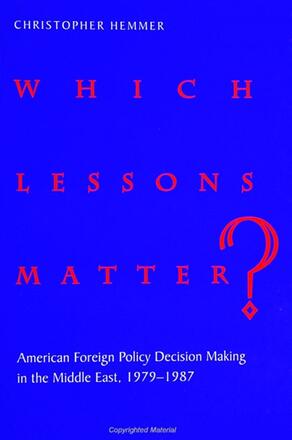
Which Lessons Matter?
American Foreign Policy Decision Making in the Middle East, 1979-1987
Alternative formats available from:
Christopher Hemmer offers a model for how U. S. decision makers use the lessons of history to diagnose and make policy choices.
Description
As policy makers turn to the lessons of history, to which lessons will they turn? This book offers a model of the analogical reasoning process that helps answer the important question of why some historical analogies are seen as relevant for later decisions, while others are ignored. It explores the previously neglected possibility that analogies can do more than simply advance the pre-existing interests of decision makers, but can also determine the very interests policy makers seek to further. The usefulness of this approach in impacting the lessons of history is demonstrated by examining American policy toward Iran concerning American hostages from 1979 to 1987, detailing both the Carter administration's policy during the Hostage Crisis and the Reagan administration's policy that resulted in the Iran-Contra Affair.
Christopher Hemmer is Assistant Professor of International Security Studies, U. S. Air War College.
Reviews
"…useful and incisive…" — CHOICE
"Hemmer demonstrates that his theoretical framework can indeed get us beyond such unhelpful generalizations as 'history is a grab bag from which policy makers select analogies to support choices arrived at for quite different reasons. ' His analysis is nuanced and he concludes that historical analogies in fact played a somewhat different role in the two cases that he examined. There is little doubt that he has made a significant contribution. " — Ole R. Holsti, author of Public Opinion and American Foreign Policy